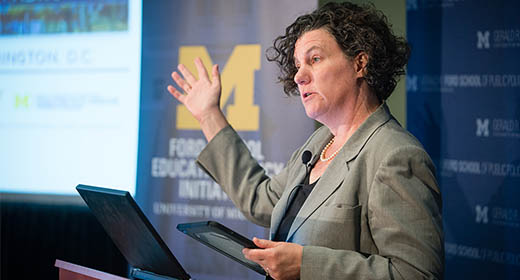
ANN ARBOR—High-achieving, low-income students who received personalized commitment of financial aid are more than twice as likely to apply, be admitted to and enroll in a top-tier university, according to a new University of Michigan study.
Research by Susan Dynarski, U-M professor of public policy, education and economics, and colleagues found that with this early commitment of aid, high school students were twice as likely to apply to U-M (67 percent compared to 26 percent) and twice as likely to enroll (26 percent compared to 12 percent).
“Students typically find out about financial aid far too late for it to affect their application choices,” Dynarski said. “Our unconditional, early commitment of four years of free tuition and fees assured students and their families that University of Michigan is within their reach.”
The researchers helped to design U-M’s High Achieving Involved Leaders (HAIL) scholarship program to reach out to low-income, high-achieving students who were uncertain about their suitability at U-M. The research also sought to address overestimates of the cost of college and procedural barriers such as financial aid forms.
“Professor Dynarski’s HAIL Scholars project is a great example of what can happen when faculty apply their research skills and creativity to a challenge confronting the university—in this case, how to economically diversify the student body,” said U-M President Mark Schlissel. “The results of this project helped us design the Go Blue Guarantee, a new financial aid program here that is already having an effect on the socioeconomic diversity of our campus and serving as an example for other universities around the country.”
In a personalized mailing, students were encouraged to apply to U-M and promised four years of free tuition and fees if admitted—a value of about $60,000, with no requirement to complete financial aid forms. Parents and principals of the eligible students were also personally notified about this offer.
“The HAIL scholarship gave students certainty about aid before college applications were due, when it could make a difference,” Dynarski said, who is co-director of the Education Policy Initiative at the Gerald R. Ford School of Public Policy.
The vast majority of admitted student ended up filling out financial aid forms, and received far more aid than just the promised tuition and fees. These students were already eligible for generous aid; they just didn’t know it.
“HAIL demonstrates our ability to counter the perception of cost before talented students self-select out of an opportunity for a U-M education,” said Kedra Ishop, vice provost for enrollment management at U-M. “We know they’re out there, they belong here, we have to find them and they have to give themselves a chance.”
For the scholarship, rising seniors at public schools across Michigan were identified through high school GPAs and scores on college-entrance exams (ACT or SAT) to select the sample. Forty percent of the schools were in southeast Michigan, where Ann Arbor and Detroit are located; 46 percent of schools were in the west-central region of the state, home to Grand Rapids; and 14 percent of schools were in the largely rural Upper Peninsula.
“If it weren’t for HAIL, many of these students would not have gone to college at all or would have attended community colleges,” said study co-author Katherine Michelmore, an assistant professor at Syracuse University. “Getting students to go to U-M, where retention rates are very high, meant they were more likely to stay in college.”
Other authors of the study are C.J. Libassi of the College Board and U-M doctoral student Stephanie Owen.
More information:
- Study: Closing the Gap: The Effect of a Targeted, Tuition-Free Promise on College Choices of High-Achieving, Low-Income Students
- Susan Dynarski
- News coverage of the study
By Mandira Banerjee | Originally published by Michigan News, December 11, 2018